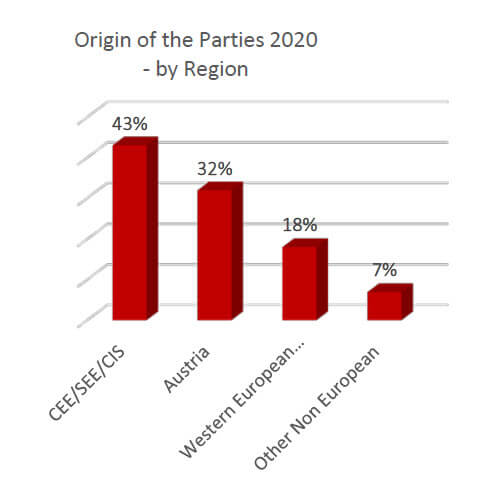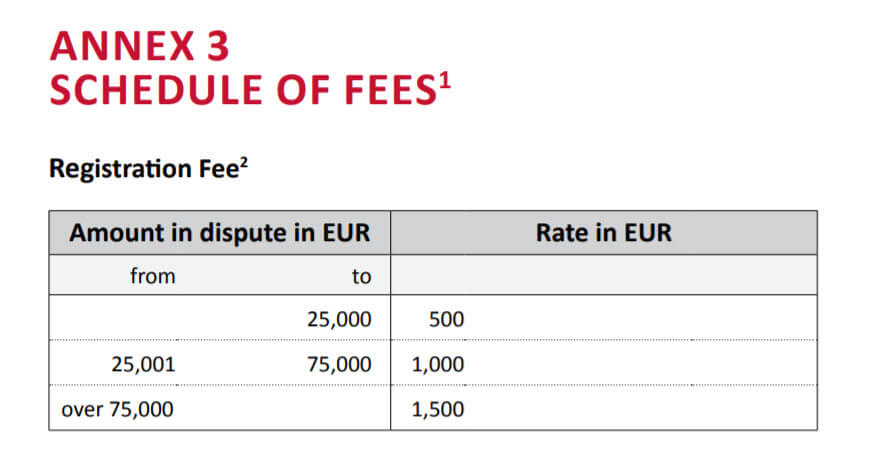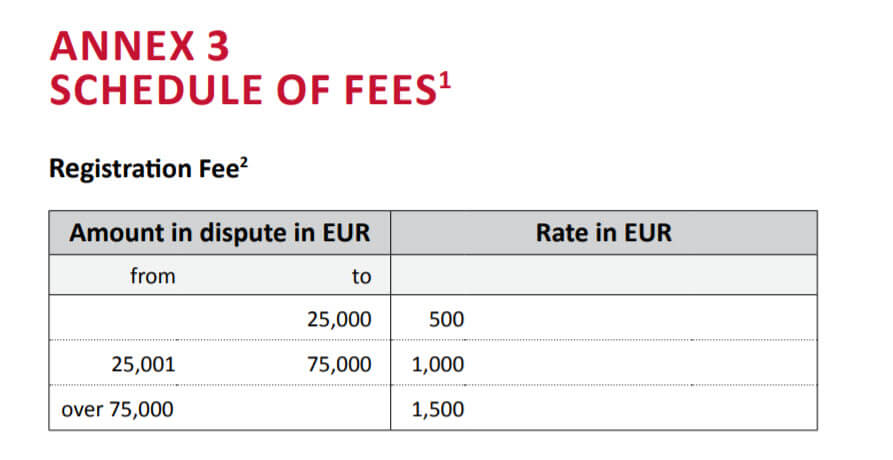The Vienna International Arbitral Center (the “VIAC”) has continued to develop and reaffirm its position as a leading arbitration institution in Europe, and namely in the region of Central and Eastern Europe, with more than 1,600 proceedings administered since its establishment in 1975 under the auspices of the Austrian Federal Economic Chamber.[1]

Today, the VIAC administers “domestic and international arbitrations as well as proceedings pursuant to other alternative dispute resolution methods”[2] agreed by the parties, such as mediation proceedings or investment arbitration. According to the latest statistics issued by the institution in 2020, although most parties came from Austria or Central/Eastern Europe, the caseload administered by the VIAC also involves an increasing number of non-Austrian or non-European parties:

In the following sections, we will discuss the main features of VIAC arbitration, with a focus on the latest developments in both commercial and investment arbitration.
VIAC Commercial Arbitration
When parties have agreed to VIAC arbitration in order to resolve their dispute, the arbitration will be conducted in conformity with the VIAC Arbitration Rules. The VIAC Arbitration Rules have undergone several revisions, adapting themselves to new challenges and developments in arbitration:
- 1983 VIAC Rules of Arbitration and Conciliation;
- 1991 VIAC Rules of Arbitration and Conciliation;
- 2001 VIAC Arbitration Rules;
- 2006 VIAC Arbitration Rules;
- 2013 VIAC Arbitration Rules;
- 2018 VIAC Arbitration Rules.
The most recent version of the arbitration rules became applicable on 1 July 2021 (the 2021 VIAC Arbitration Rules).[3] Its provisions are divided into the following chapters:
- General Provisions (Articles 1-6);
- Commencement of the Arbitration (Articles 7-13a);
- Joinder of Third Parties and Consolidation (Articles 14-15);
- Arbitral Tribunal (Articles 16-22);
- Challenge of Experts (Article 23);
- Jurisdiction of the Arbitral Tribunal (Article 24);
- Proceedings before the Arbitral Tribunal (Articles 25-41);
- Costs (Articles 42-44); and
- Miscellaneous Provisions (Articles 45-47).
In this new version of its rules, the VIAC has introduced several innovations. For example, it contains an express provision for transparency regarding the existence of third-party funding agreements. Article 13a(1) of the 2021 VIAC Arbitration Rules provides that “[a] Party shall disclose the existence of any third-party funding and the identity if the third-party funder in its statement of claim or its answer to the statement of claim, or immediately upon concluding a third-party funding arrangement.”
It also reflects procedural adaptations imposed by the Covid-19 pandemic. Article 30 of the 2021 VIAC Arbitration Rules expressly provides, “Having due regard to the views of the parties and the specific circumstances of the case, the arbitral tribunal may decide to hold an oral hearing in person or by other means”, e.g., via videoconference.
VIAC Model Commercial Arbitration Clause
Parties wishing to have their dispute resolved in conformity with the VIAC Arbitration Rules are free to insert the following model VIAC arbitration clause into their contract:
All disputes or claims arising out of or in connection with this contract, including disputes relating to its validity, breach, termination or nullity, shall be finally settled under the Rules of Arbitration (Vienna Rules) of the Vienna International Arbitral Centre (VIAC) of the Austrian Federal Economic Chamber by one or three arbitrators appointed in accordance with the said Rules.
Initiation of VIAC Commercial Arbitration
Pursuant to Article 7 of the 2021 VIAC Arbitration Rules, a party can initiate a VIAC arbitration by “submitting a statement of claim.” Paragraph 2 of this Article provides that the statement of claim shall contain the following mandatory information:
- the full names, addresses, including electronic mail addresses, and other contact details of the parties and any comment on the parties’ nationalities;
- a statement of the facts and a specific request for relief;
- the monetary value of each individual claim at the time of submission of the statement of claim if the relief requested is not exclusively for a specific sum of money;
- particulars regarding the number of arbitrators in accordance with Article 17;
- the nomination of an arbitrator if the dispute shall be decided by a panel of three arbitrators, or a request that the arbitrator be appointed by the Board; and
- particulars regarding the arbitration agreement and its content.
Upon receipt of the statement of claim by the Secretary General and its transmittal to the opposing party, the latter will be requested to submit an answer to the statement of claim within 30 days (Article 8 of the 2021 VIAC Arbitration Rules). Again, the answer to the statement of claim shall contain the following mandatory information:
- the full name, address, including electronic mail address, and other contact details of the respondent and any comment on the parties’ nationalities;
- comments on the request for relief and the facts upon which the statement of claim is based, as well as the respondent’s specific request for relief;
- particulars regarding the number of arbitrators in accordance with Article 17; and
- the nomination of an arbitrator if the dispute shall be decided by a panel of three arbitrators, or a request that the arbitrator be appointed by the Board.
Costs of VIAC Commercial Arbitration
Pursuant to Article 44 of the 2021 VIAC Arbitration Rules, the costs of arbitration are divided as follows:
- the administrative fees of the VIAC, the arbitrators’ fees and the reasonable expenses (such as arbitrators’ or tribunal secretary’s travel and subsistence costs, costs for sending of communications, rent, court reporter fees), including any applicable value-added tax;
- the parties’ costs, i.e., the reasonable expenses of the parties for their legal representation; and
- other expenses related to arbitration.
In addition, pursuant to Article 10 of the 2021 VIAC Arbitration Rules, the party initiating arbitration must pay a non-refundable registration fee. Only upon such payment, the “statement of claim or any request for joinder of a third party shall be sent to the other parties”. The amount of the comparatively low registration fee is defined in Annex 3 to the 2021 VIAC Arbitration Rules and depends on the amount in dispute:

Following payment of the registration fee, the parties will be required to pay administrative fees and fees for the services of the members of the arbitral tribunal.
Administrative fees and fees for the arbitral tribunal are paid in the form of advances on costs. Pursuant to Article 42(1) of the 2021 VIAC Arbitration Rules, “The Secretary General shall fix the advance on costs for VIAC’s prospective administrative fees, the prospective arbitrators’ fees and the prospective expenses, including any applicable value added tax, separately for claims and counterclaims.” In conformity with Article 42(4) of the 2021 VIAC Arbitration Rules, the advance on costs “shall be paid in equal shares by the parties prior to the transmission of the file to the arbitral tribunal within 30 days upon receipt of the request for payment.”
If a party fails to make a payment of its share of the advance on costs, pursuant to Article 42(9) of the 2021 VIAC Arbitration Rules the other party will be asked to make a payment by substitution. It is to be noted that, in accordance with Article 42(11) of the 2021 VIAC Arbitration Rules, the arbitral tribunal shall address only those claims and counterclaims “for which the advance on costs has been paid in full.” If full payment has not been received, the proceedings may be suspended by the arbitral tribunal or terminated by the Secretary General with respect to the relevant claims or counterclaims.
Parties desiring to initiate a VIAC arbitration can estimate the administrative and arbitral tribunal’s fees using the cost calculator available on the VIAC’s official website.
Regarding legal fees, i.e., fees incurred by each party for its legal representation, they depend on the law firm used and are typically borne by each party. However, these costs as well as administrative and tribunal fees and expenses may be recovered in the final award. Pursuant to Article 38(2) of the 2021 VIAC Arbitral Rules, “The arbitral tribunal shall also establish who will bear the costs of the proceedings or the apportionment of these costs. Unless the parties have agreed otherwise, the arbitral tribunal shall decide on the allocation of costs according to its own discretion. The conduct of any or all parties as well as their representatives (Article 13), and in particular their contribution to the conduct of efficient and cost-effective proceedings, may be taken into consideration by the arbitral tribunal in its decision on costs according to this Article.”
VIAC Investment Arbitration
In July 2021, the VIAC published a new set of arbitration rules adapted to disputes relating to foreign investment (“2021 VIAC Investment Arbitration Rules”). Although its provisions mirror to some extent the provisions of the 2021 VIAC Arbitration Rules, it contains several investment arbitration specific features.
Consent to VIAC Investment Arbitration and Model VIAC Investment Arbitration Clause
Pursuant to Article 1 of the 2021 VIAC Investment Arbitration Rules, an agreement to “submit a dispute to arbitration in accordance with the VIAC Rules of Investment Arbitration […] may be expressed in a contract, treaty, statute or other instrument, or through an offer by a party in a contract, treaty, statute or other instrument which is subsequently accepted by the other party by any means, including by the other party’s commencement of arbitration.” This means that such consent can be expressed prior to the existence of a dispute in a contract or a treaty, typically by virtue of the following model VIAC Investment Arbitration clause, or even after a dispute has arisen by the express agreement of the parties:
All disputes or claims arising out of or in connection with this contract, including disputes relating to its validity, breach, termination or nullity, shall be finally settled under the Rules of Investment Arbitration (Vienna Investment Arbitration Rules) of the Vienna International Arbitral Centre (VIAC) of the Austrian Federal Economic Chamber by one or three arbitrators appointed in accordance with the said Rules.
The preamble to the 2021 VIAC Arbitration Rules also specifies that “[w]here the parties to a dispute have previously consented, or a party has previously offered to consent, to arbitration in accordance with rules of arbitration other than the Vienna Investment Arbitration Rules [for example, ICSID Arbitration Rules], a dispute may be submitted instead to arbitration in accordance with the Vienna Investment Arbitration Rules if the parties subsequently expressed their agreement to submit their dispute to arbitration in accordance with the Vienna Investment Arbitration Rules.”
Waiver of State Immunity
By consenting to VIAC Investment Arbitration “a party shall be deemed to have waived any right of immunity from jurisdiction in respect of proceedings relating to the arbitration to which such party might otherwise be entitled” (Article 4 of the 2021 VIAC Investment Arbitration Rules). However, it is specified that a waiver “of immunity relating to the enforcement of an arbitral award must be expressed separately.” This means that in case an investor obtains a favourable award against a State or a State entity, it may not be able to enforce the award against assets protected by State immunity, unless a specific waiver in this regard is obtained from the State.
Early Dismissal of Claims, Counterclaims and Defenses
According to Article 24a of the 2021 VIAC Investment Arbitration Rules, a party may apply for the early dismissal of claims, counterclaims and defenses on the following grounds:
- a claim, counterclaim or defense is manifestly outside the jurisdiction of the arbitral tribunal;
- a claim, counterclaim or defense is manifestly inadmissible;
- a claim, counterclaim or defense is manifestly without legal merit.
Pursuant to paragraph 2 of Article 24a, such application must be made “no later than 45 days after the constitution of the arbitral tribunal or the submission of the answer to the statement of claim, whichever is earlier.”
Cost of VIAC Investment Arbitration
One of the most appealing features of VIAC Investment Arbitration is, perhaps, its costs. For example, as for commercial arbitration, the amount of the registration fee depends on the amount in dispute (Annex 3 to the 2021 VIAC Arbitration Rules):

This is significantly lower than the registration fees required by other investment arbitration institutions, such as the ICSID, whose registration fee is a lump sum of USD 25,000.00 (see ICSID Schedule of Fees). The overall costs of VIAC investment arbitration can also be estimated using the online cost calculator.
[1] “About us – Quality Standards and mission statement”, VIAC website (last accessed on 30 July 2021).
[2] 2021 VIAC Arbitration Rules, Article 1.
[3] For more information, see “VIAC revises arbitration rules and published new rules for investment arbitration”, Practical Law Arbitration, published on 30 June 2021; J. Kathan-Spath, A. Fremuth-Wolf, “VIAC Rules Revision 2021 Part I: Revised Vienna Rules Enter into Force on 1 July 2021”, Kluwer Arbitration Blog, published on 1 July 2021.